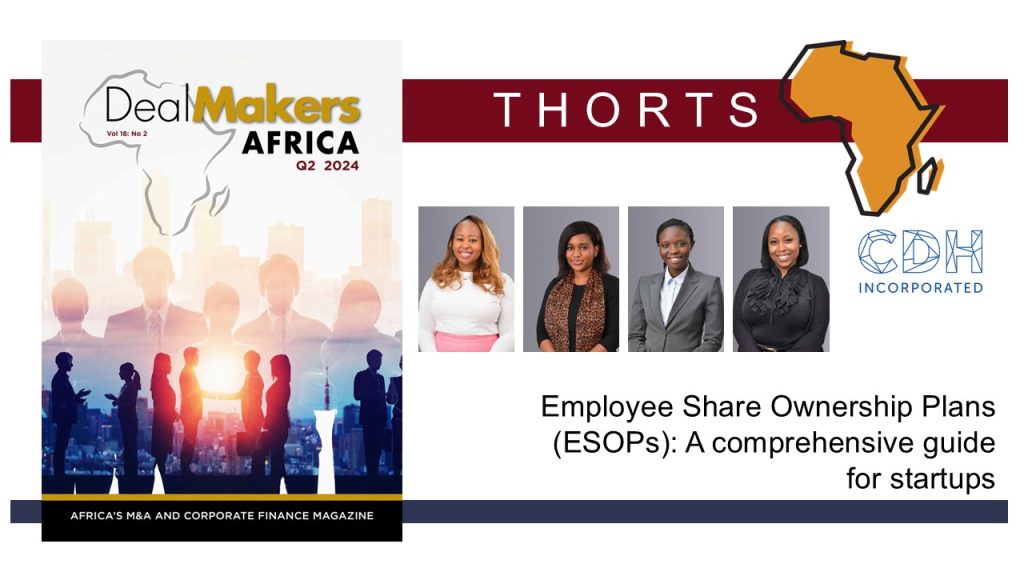Start-ups face fierce competition in terms of attracting and retaining top talent crucial for success, but establishing an Employee Share Ownership Plan (ESOP) can provide a competitive edge to compete with established companies that can afford higher salaries, while conserving resources to grow the company. An ESOP is an employee benefit plan that allows employees to acquire a stake in the company through shares.
ESOPs take different forms, ranging from a share option plan – where a portion of a company’s shares are granted to the employees as fully paid at a future date and on meeting certain criteria – to phantom share schemes, where a company provides benefits that mirror ownership of shares without any legal transfer of shares.
This article discusses the considerations when setting up an ESOP, and the benefits to start-ups.
IMPORTANT CONSIDERATIONS
Vesting
There are two critical dates when establishing ESOPs: the grant date and the vesting date. These determine the relevant date for the determination of the market value of the shares in a company. The grant date is when the company gives the option of the shares to the employees, while the vesting date is when an employee acquires the full benefit of the shares upon meeting specified conditions.
The vesting period is the time between when an employee is granted the right to purchase and when the employee can actually buy the shares. A vesting schedule outlines when employees can exercise the option to purchase shares. This can take the form of ‘cliff’ vesting, where full ownership happens after several years, or a milestone or ‘graded’ vesting, which allows for gradual accumulation of ownership over time, such as a certain percentage after two years and then for subsequent years until the shares are fully vested in the employee.
Regulations
In Kenya, there are no specific regulations for ESOPs. However, the Capital Markets Authority’s (Collective Investment Schemes) Regulations, 2001 (Regulations) require public entities establishing an ESOP to be structured as a unit trust with a comprehensive trust deed and rules. As best practice, private companies aim to meet the standards required by the Regulations. A private company must, however, ensure that an ESOP is allowed by the company’s memorandum of association and approved by the board and shareholders.
It is also important to note, when structuring an ESOP, that the Finance Act 2023 grants relief for start-up employees, as they do not have to pay tax immediately on the shares acquired under an ESOP. Tax is due when the employee gains a financial benefit, either at the vesting or exercising stage. The benefit is determined by the market value of the shares on the earliest of (i) five years after the award of the shares; (ii) the disposal of the shares by the employee; or (iii) cessation of employment.
To benefit from this relief, the start-up must have been incorporated in Kenya for less than five years, have an annual turnover below KES 100,000,000, and not offer management or training services or have been formed after restructuring an existing entity.
Exiting employees
Generally, when an employee leaves before the shares have vested, any unvested option lapses. However, the scheme can provide partial vesting based on the length of employment or other specified criteria, taking into consideration the circumstances of the employee’s departure.
The ESOP can outline ‘good leaver’ provisions; that is, where an employee leaves because of serious illness, retirement, or resignation due to relocation, the employee may still be entitled to the full value of the vested shares. In the case of unvested shares, the employee may be granted the right to exercise the option in the future. In the alternative, a ‘bad leaver’ provision covers situations where an employee is terminated for misconduct or fails to meet performance standards, whereby the employee will be subject to a reduced value or no value at all for their vested options.
Termination
A company may terminate an ESOP scheme due to financial difficulty, a change in industry affecting the business, or based on a merger or acquisition. Terminating the ESOP must comply with regulatory requirements and the scheme establishing instruments, especially when it comes to the valuation of the shares. Common methods include full or partial distribution of benefits to participants, allowing them to exercise their rights within a specified timeframe, especially considering the tax implications for the employees. Alternatively, the ESOP scheme can provide that all shares are fully vested to the participants of the scheme on termination, or the company can propose a freeze of the ESOP for a certain period until a change in circumstances.
ADVANTAGES AND DISADVANTAGES
Advantages
- Financial conservation: offering ownership stakes in lieu of high salaries conserves financial resources by offering a flexible compensation structure without straining cash flow.
- Employee retention: gradual ownership helps retain top talent, ensuring continuity and stability.
- Morale and alignment: an ownership mindset encourages a collaborative and inclusive workplace culture.
- Increased productivity: ownership incentives motivate employees to dedicate themselves fully to the company’s success, leading to higher productivity and improved performance outcomes.
Disadvantages
- Dilution of ownership: issuing equity to employees dilutes the ownership stake of founders and investors, potentially restricting control over strategic decisions. A phantom share scheme would be preferable, as it does not grant legal ownership of shares.
- Share price fluctuations: higher share prices are dependent on the company’s performance. ESOPs are beneficial to employees of companies that produce predictable and consistent financial results. This might be difficult for start-ups, making the ESOP less beneficial for retaining employees.
Striking the right balance between ESOP compensation and cash compensation is essential to ensure employees can meet their immediate financial needs while still being incentivised by the ownership opportunity. Therefore, founders need to be clear on the aim of the ESOP based on their industry, and carefully consider the structure that will benefit both the entity and the employees.
Njeri Wagacha is a Partner, Rizichi Kashero–Ondego a Senior Associate, Sheilla Mokaya an Associate and Wambui Kimamo an Intern I CDH Kenya

This article first appeared in DealMakers AFRICA, the continent’s quarterly M&A publication.
DealMakers AFRICA is a quarterly M&A publication
www.dealmakersafrica.com



